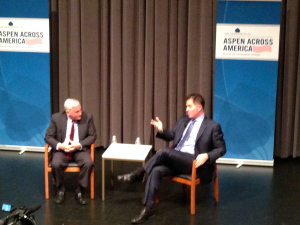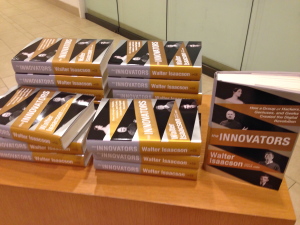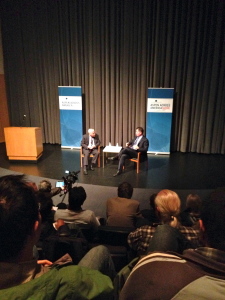By LAURA LOREK
Reporter with Silicon Hills News
 The Aspen institute, an educational and policies studies organization based in Washington, D.C., launched Aspen Across America, a series of talks with extraordinary individuals Wednesday night.
The Aspen institute, an educational and policies studies organization based in Washington, D.C., launched Aspen Across America, a series of talks with extraordinary individuals Wednesday night.
The series kicked off at the Blanton Art Museum with a talk between Journalist and world-renowned biography Walter Isaacson and one of Austin’s top tech innovators and entrepreneurs Michael Dell, founder of Dell Computers. The University of Texas at Austin sponsored the event.
“Austin is a hotbed of innovation and high tech development and it has been for more than 30 years and it continues to grow along with our university,” said Gregory Fenves, executive vice president and provost of the University of Texas at Austin.
The Aspen Institute chose Austin to launch its series, in part, because the city reflects “innovation and creativity and the spirit of human potential.”
Dell’s Entrepreneurial Roots
 Isaacson’s latest book is The Innovators: How a Group of Hackers, Geniuses and Geeks created the Digital Revolution.” In his role as a biographer, Isaacson asked Dell to recount his early years as an entrepreneur and his fascination with computers as a young kid growing up in Houston.
Isaacson’s latest book is The Innovators: How a Group of Hackers, Geniuses and Geeks created the Digital Revolution.” In his role as a biographer, Isaacson asked Dell to recount his early years as an entrepreneur and his fascination with computers as a young kid growing up in Houston.
In Junior High, Dell got access to a Teletype terminal during his math class. He would stay after school and type in programs. He began to learn about microprocessors from Byte Magazine. And there was a Radio Shack store between his house and the school that he frequented.
When he was 15 he saved enough money to buy an Apple II. He took it apart and he figured out how it worked and how to upgrade it.
In 1981, IBM released its personal computer and at the age of 16, Dell became fascinated with them. He started upgrading the machines and that continued when he entered college.
“I kind of had this side activity while I was going to school of upgrading these machines,” Dell said. “It got in the way of my studies a little bit.”
Around November of 1983, his parents thought he was focusing more on his computer business than his studies. They paid him a surprise visit to his dorm room and they gave him a stern lecture. Dell told his parents he would quit doing the computer business and focus on his studies. That lasted about 10 days.
“I really, really tried hard,” Dell said. “During that 10 days, I decided it wasn’t a hobby or a fun thing, it was actually something I was very, very passionate about and something I wanted to do much, much more. If they hadn’t made me stop I might never have done the company.”
The Beginning of Dell’s Computer Business
Dell incorporated the company about a week before finals. He finished his freshman year as a biology major. Then he dropped out of the University of Texas and founded Dell Computers with $1,000. He relocated the company from his dorm room to a proper office.
The business grew in the first nine month to $6 million, Dell said. It grew in the next year to $33 million, he said. It grew about 80 percent per year compounded for eight years and then for the six years after that it grew 60 percent, he said.
Dell’s secret sauce was the way he sold the PCs.
“It was certainly the time of enormous growth in the personal computer industry,” he said. “But what I observed was the way the machines were being sold was inefficient. When we introduced our 286 machine it was twice the performance of the IBM machine and half the price.”
Dell created a new business model and a new way to engage with customers.
At that point, Isaacson pointed out that what Dell has in common with Benjamin Franklin, Albert Einstein, Steve Jobs, Mark Zuckerberg and Bill Gates is that they all dropped out of college.
“Was being rebellious and willing to take that big leap an important part what made you who you are?” Isaacson asked.
“It actually didn’t seem like a big risk,” Dell said. “Because at the University of Texas, if you leave for a semester, you can come back. We kind of came to an understanding, my parents and I, that I would take the business into a different phase and if it worked I would keep doing it, and so far, so good.”
At age 27, Dell became the youngest CEO of a Fortune 500 company ever. Isaacson asked him what that was like.
“It was fun,” Dell said. “The good news is I wasn’t the first young person in the technology sector. There were others I could look to that had done things like that. We were just focused on growing our business, expanding around the world, tons of opportunity.”
Going Private
Next, Isaacson quizzed Dell about the completion of taking the company private. Dell Computers had been a public company for 25 years and last October it went private.
“How liberating has that been?” Isaacson asked.
“It’s been great,” Dell said. “It really has allowed us to think about the business in a different way. To think about it more in a three year, five year and 10 year horizon. To take on some risks that are harder to take on in a public company. It’s allowed us to go after some investments we’ve been able to go after. “
 As a private company, Dell has been able to accelerate its growth rate, gain market share in its various businesses and they are all performing well, Dell said. Now that the company is private it has invested hundreds of millions of dollars in projects that will lower its earnings in the short term but will be great businesses years from now, Dell said. The company has made big investments in Healthcare, Cloud computing, software and cybersecurity.
As a private company, Dell has been able to accelerate its growth rate, gain market share in its various businesses and they are all performing well, Dell said. Now that the company is private it has invested hundreds of millions of dollars in projects that will lower its earnings in the short term but will be great businesses years from now, Dell said. The company has made big investments in Healthcare, Cloud computing, software and cybersecurity.
Dell doesn’t have to respond to a 90-day shot clock any longer. As a publicly traded company, Dell had to report its earnings every 90 days and that led to a short-term focus for the business, Dell said. As a private company, Dell enjoys the benefit of planning for the long term.
The healthcare industry and information technology
The healthcare technology industry holds a lot of promise for Dell, he said.
“You look at the economy, healthcare is consuming a larger and larger portion of the economy but IT has not played the transformative role it has in healthcare as it has in other sectors,” he said.
Healthcare will become more effective, efficient and affordable through the use of data and analytics, Dell said.
“Our whole industry has an incredible amount of computing power that is being made available at lower costs,” he said.
By combining computing power with genomic research, healthcare providers can create targeted therapy for specific types of cancer, Dell said. For example, they can tackle conditions like neuroblastoma, a deadly childhood cancer. And in a very short period of time, they can create a therapy for a patient that would have taken 10 times or 100 times the time and it wouldn’t have been as targeted, Dell said.
Medical imaging is another area that can be tapped into to provide better analysis. Dell stores eight billion medical images for customers. If physicians could access that database easily they might be able to use it to diagnose and treat patients more effectively, he said.
The Data Revolution
The next wave in the digital revolution will be the merger of the information technology and life sciences and healthcare industry, Isaacson said.
That will not be the only wave, Dell said.
“If you think about computing power, its cost is just coming down at a tremendous rate,” he said. “For a few pennies, you can put silicon in any number of devices, machines, gadgets and physical objects. And say you go from having a billion connected devices to 100 billion or a trillion. Now you are creating enormous amounts of data and that data can be used to create better outcomes, better results and improved productivity, efficiency. And again you step back and you look at the world’s unsolved problems whether they be in energy, environment or medicine as we get more computational power I think we’ll address those problems at a faster rate. It’s a very exciting time. “
The data economy will provide the next trillion dollars of growth for Dell’s customers, he said.
Innovation in the Education
Education is another area ripe for disruption and innovation, Isaacson said.
Benjamin Franklin created the one room school in Philadelphia and if he walked into a school today, he’d see a room, about 24 desks and a blackboard in the front, the same thing they had back then, Isaacson said.
“The things that have not changed very much, don’t change very quickly,” Dell said. And that’s K-12 education, he said. But Dell, through the Michael and Susan Dell Foundation are working to improve that in the U.S. and throughout the world by using better data and common measurements.
“You’ve got to have a dashboard, you’ve got to have data to judge outcomes,” he said.
Monopolies aren’t very good at changing, Dell said.
“That’s been a big part of the problem with school districts,” he said.
The Michael and Susan Dell Foundation
Isaacson asked Dell what lessons he has learned in business that applies to philanthropy.
“We’ve certainly learned that data matters,” Dell said. “It’s Ok to experiment and make mistakes. We’ve learned that many philanthropic or charitable organizations have great intentions but their ability to execute don’t match up necessarily. We’ve had a pretty hands on approach in ensuring the results of our grants.”
The Dell Foundation likes to find areas to make a discernable difference in a defined amount of time and then move on to something else, Dell said.
Isaacson pointed out that unequal opportunity among kids in our society seems to be widening and asked Dell what could be done to make opportunities for every kid in America more equal?
That’s not just a question for America, but a question for what’s going on in the world economy, Dell said
“A kid that doesn’t have the 21st century skills in a developed country is going to have a difficult time keeping up,” Dell said. “The education system has had a difficult time keeping up with that requirement. I think this is a big, big challenge.”
How Does Dell Foster Creativity?
During the question and answer session with the audience, one person asked Dell how he keeps his company competitive and creative.
One of the challenges big companies have, as they grow, is that they don’t want to take risks., Dell said.
“Part of my job is to reinsert risk into the company, which means you have to accept some failure,” he said. “If you’re failing over and over again at the same thing, that’s not risk, that’s something else. We consciously take on projects. Think about it this way, you’ve got 10 projects and seven or eight of them work out well and a couple of them don’t work that’s ok.”
But the key is to try new things and experiment, he said.
“As companies grow, they often forget to keep experimenting,” he said. “The reason you got to be a large company is because you took on risk, you accepted failure and you weren’t looking for the perfect solution. We have all kinds of programs and incentives to encourage that.”
As a private company, Dell can be bolder and take on more risk, he said.
“The results may be more volatile but that’s the way things happen,” he said. “There’s no such thing as the straight trajectory of a business.”
And the best way to grow is to listen to your customers, Dell said.
“It sounds kind of corny but the best mentors for us have been our customers,” he said. “We just learned the most from our customers.”
One young man asked Dell what advice he would give to young entrepreneurs.
“Experiment,” Dell said. “Don’t be afraid to fail. Just get started. You’ll know more six months after starting. Just start.”

